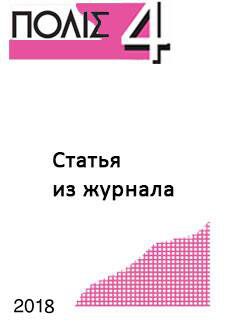Online shop of "Polis. Political Studies" Journal
We in the world, the world in us
Gutorov V.A., Tarasov I.N. Post-Communism in Institutional, Ideological and Communicative Dimensions: Critical Notes. Part II. – Polis. Political Studies. 2018. No 4. P. 72-83 (In Russ.) .
150 руб.
new political language; intellectuals; mass media; manipulative technologies; mediocratic projects; post-communist nationalism; social pathology; systemic crisis.
The second part of the article is devoted to the question of the role played by political communication and the mass media in the development of social processes in the Central and Eastern Europe. The study of paradoxical properties of the phenomenon of post-communism has become one of the most important incentives for the turn of the humanities in the direction of analyzing the specifics of the new communicative and rhetorical properties of political texts in the structure of ideological discourses both in Europe and outside it. The specific nature of post-communist social communication when ideological labels are often meaningless and exchangeable, and citizens remain unengaged in the political process, increased the role of manipulative factors realized through the media. This tendency initially manifested itself in various “mediocratic” projects and utopias based on the desire of politicized intellectuals to form a “new political language” and thereby strengthen their positions in political discourse, ultimately winning the legitimate right to power. The rapid evolution of the post-communist political discourse from “liberal humanism” and “universal values” to reactionary myth-making, nationalist rhetoric and xenophobia, clearly demonstrates that one of the main sources of constant ideological transformations in the public consciousness is the extremely contradictory political ideas and attitudes of intellectuals rushing into power already at the initial stage of reforms. At the same time, crisis situations, the growth of traditionalist nationalism indicate that pathological tendencies and changes in the structures of post-communist regimes have a systemic and global character.
 English
English Русский
Русский

Reviews
There are no reviews yet.